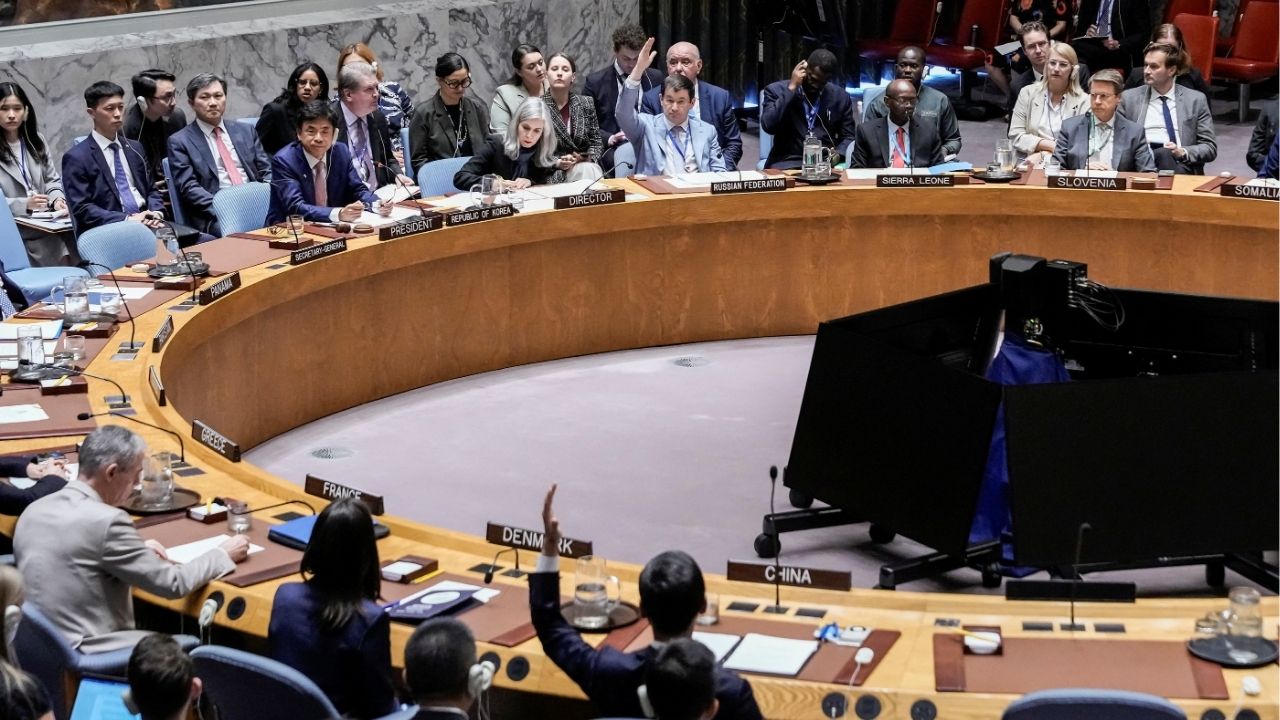Members of the United Nations Security Council vote on a resolution by Russia and China to delay by six months the reimposition of sanctions on Iran during the 80th U.N. General Assembly in New York City, U.S., September 26, 2025. (Reuters File)
Share
|
Getting your Trinity Audio player ready...
|
UNITED NATIONS — United Nations sanctions are set to be reimposed on Iran later on Saturday – a move Tehran has warned will be met with a harsh response – over accusations the country has violated a 2015 deal with world powers that aimed to stop it developing a nuclear bomb.
The end of the nuclear deal originally negotiated by Iran, Britain, Germany, France, the United States, Russia and China is likely to exacerbate tensions in Middle East, just months after Israel and the U.S. bombed Iranian nuclear sites.
However, Iranian President Masoud Pezeshkian appeared to downplay the issue, telling reporters before he left New York on Friday: “It is not like the sky is falling.”
Attempts to delay the return of all sanctions on Iran, initially imposed by the U.N. Security Council between 2006 and 2010, failed on the sidelines of the annual gathering of world leaders at the U.N. this week.
The sanctions are due to return at 8 p.m. EDT on Saturday (0000 GMT) after Britain, France and Germany, known as the E3, triggered a so-called snapback process 30 days ago accusing Tehran of violating a 2015 nuclear deal. Iran denies seeking nuclear weapons.
The European powers had offered to delay reinstating sanctions for up to six months to allow space for talks on a long-term deal if Iran restored access for U.N. nuclear inspectors, addressed concerns about its stock of enriched uranium, and engaged in talks with the United States.
“In past days and weeks, Iran has put forward multiple proposals to keep the window for diplomacy open. The E3 has failed to reciprocate while the U.S. has doubled down on its dictates,” Iranian Foreign Minister Abbas Araqchi posted on X on Friday.
European Union sanctions are due to return next week.
Iran Envoys Recalled
Tehran has warned of a harsh response. But Iranian President Masoud Pezeshkian said on Friday that Iran had no intention to leave the Non-Proliferation Treaty.
Iran’s said on Saturday it was recalling its ambassadors to Britain, France and Germany for consultations.
Iran’s economy is already struggling with crippling sanctions reimposed since 2018 after U.S. President Donald Trump ditched the pact during his first term.
Iran’s rial currency continued to decline over fears of new sanctions. The rial fell to 1,123,000 per U.S. dollar, a new record low, on Saturday, from about 1,085,000 on Friday, according to foreign exchange websites, including Bon-bast.com.
Iran will again be subjected to an arms embargo and a ban on all uranium enrichment and reprocessing activities and any activity related to ballistic missiles capable of delivering nuclear weapons, including launches.
Other sanctions to be reimposed include a travel ban on dozens of Iranian individuals, an asset freeze on dozens of Iranian individuals and entities and a ban on the supply of anything that could be used in Iran’s nuclear program.
All countries are authorized to seize and dispose of an items banned under U.N. sanctions and Iran will be prohibited from acquiring an interest in any commercial activity in another country involving uranium mining, production or use of nuclear materials and technology.
—
(Reporting by Michelle Nichols; Editing by Toby Chopra and Nick Zieminski)
RELATED TOPICS:
Categories

Reddit Goes Down for Thousands of Users, Downdetector Shows



















